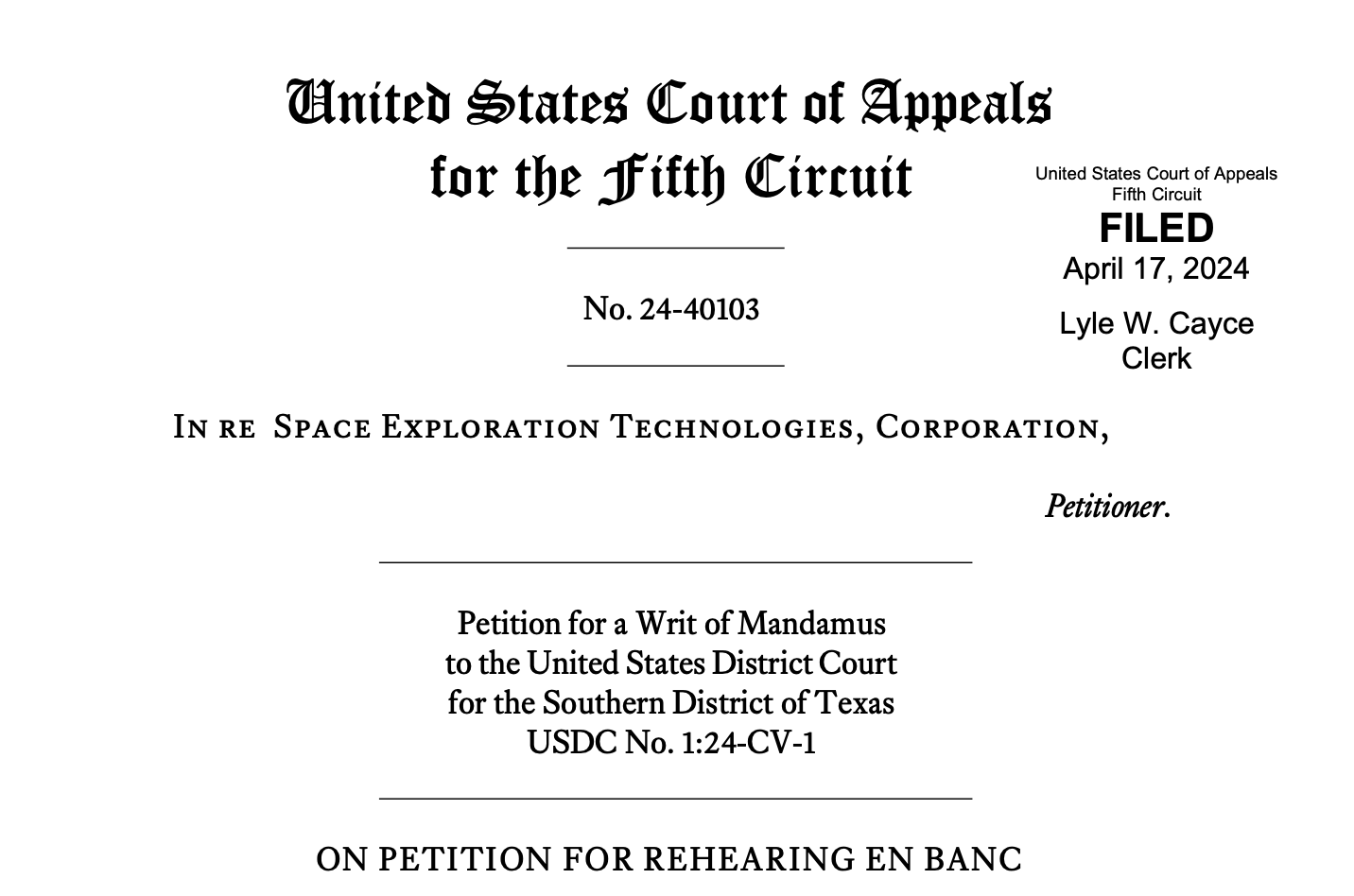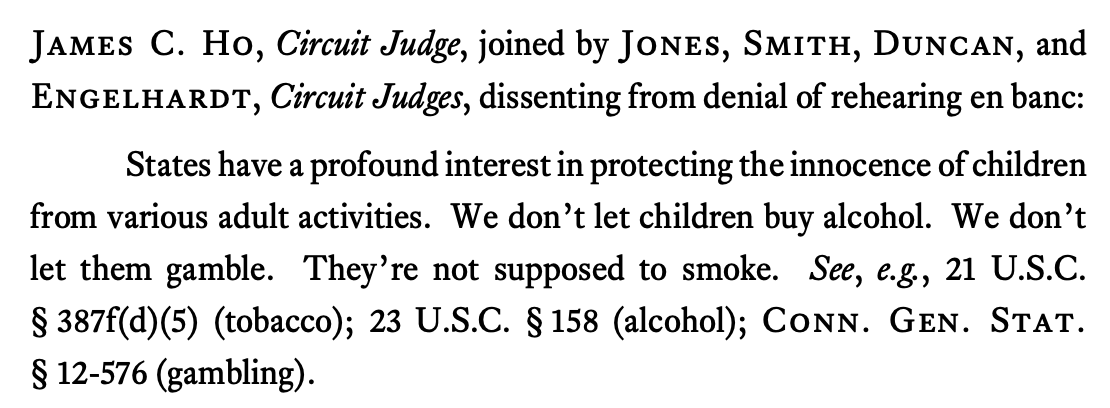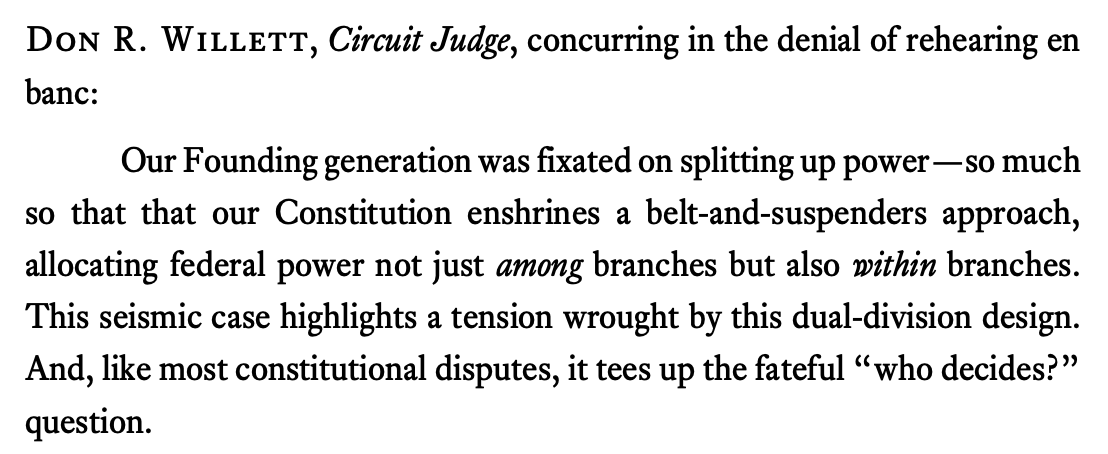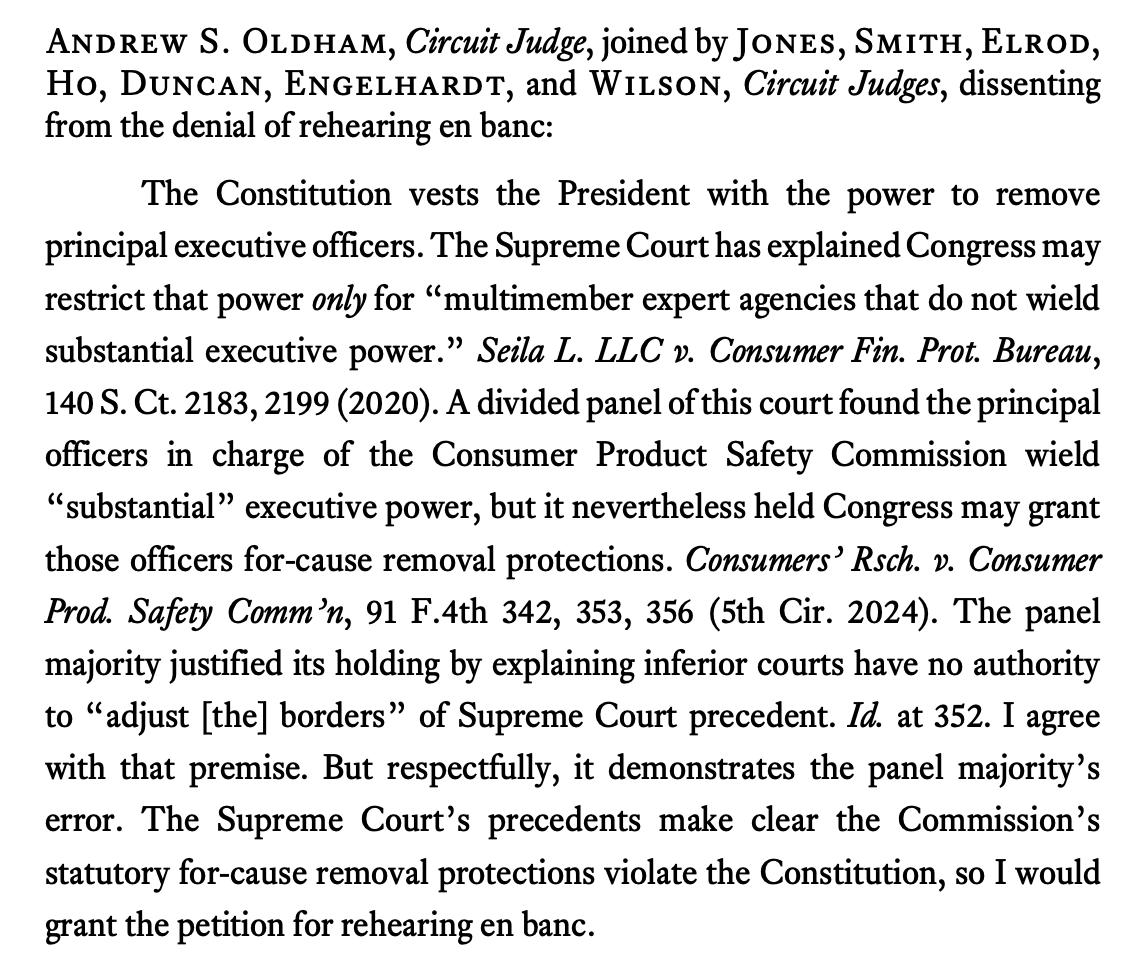The Fifth Circuit did the absolute least it should do this week — and that's news
The court issued a trio of orders declining to have the full court review decisions that conservatives seeking to transform the law lost before three-judge panels.
On Wednesday, the U.S. Court of Appeals for the Fifth Circuit issued its third ruling this week denying conservatives’ requests for the full court to sit en banc and review earlier decisions that had failed to back the conservatives in their far-right transformative legal aims.
By and large, the rulings — denying en banc review of prior three-judge panel decisions — have come about because less extreme Republican appointees joined with the five Democratic appointees on the 17-person court to vote against en banc review, which requires a majority vote of the full court to grant.
These decisions, to be clear, have not advanced any liberal or progressive project. To the contrary, they mostly prevented far-right legal efforts by Texas and against labor and consumer protection agencies to proceed as conservatives wanted them to proceed. Two of the three cases are almost certain to proceed in other courts.
This was, in other words, the Fifth Circuit doing the absolute least that we should expect of appeals courts: It let a district court do its job to consider venue questions, kept an offensive law that ignores the First Amendment on several grounds blocked based on a business challenge, and let the U.S. Supreme Court decide when it’s going to overturn Supreme Court precedent.
And yet, on today’s Fifth Circuit court, all three of those decisions were one-vote propositions.
How did it happen? The Democratic appointees — Judge Carl Stewart, James Graves Jr., Stephen Higginson, Dana Douglas, and Irma Carrillio Ramirez — have received support this week in their opposition to en banc review from Judges Leslie Southwick and Catharina Haynes, George W. Bush appointees; Judges Don Willett and Cory Wilson, Trump appointees, on two cases each; and, in one case, Chief Judge Priscilla Richman, another George W. Bush appointee.
Both of the remaining Reagan appointees on the court, Judges Edith Jones and Jerry Smith; the final George W. Bush appointee, Judge Jennifer Walker Elrod; and the other Trump appointees, Judges James Ho, Kyle Duncan, Kurt Engelhardt, and Andy Oldham voted to rehear all of the cases in which they participated.
On Wednesday, it was Elon Musk’s SpaceX whose request was denied.
SpaceX brought a lawsuit in Texas to challenge predominantly California-based labor actions being questioned by the California-based division of the National Labor Relations Board. SpaceX’s lawsuit is a part of a larger effort to challenge the constitutionality of the board, and the company and its anti-labor lawyers at Morgan Lewis appear to want this challenge to be heard in the extremely conservative Fifth Circuit. After much back and forth — shenanigans covered previously here — a three-judge panel of the Fifth Circuit agreed, on a 2-1 vote, that the district court judge should be allowed to transfer the case to California if that’s what the district court thought appropriate. (Haynes and Douglas were in the majority; Elrod dissented.)
SpaceX and its Morgan Lewis lawyers then asked the full court to reconsider that decision, and the Fifth Circuit denied that request in an 8-8 vote on Wednesday. Notably, Ho did not participate — meaning his recusal was almost certainly outcome-determinative.
While eight judges voted for rehearing, neither Richman nor Willett joined the dissent authored by Jones (that included republishing Elrod’s panel dissent).
Nonetheless, they lost, so the district court judge is now free to, yet again, transfer the case, again, to a district court in California. Already Wednesday night, however, SpaceX and Morgan Lewis are trying, yet again, at the district court to prevent transfer of the case to California.
In one of the Tuesday cases, the Fifth Circuit denied, on an 8-9 vote, Texas’s attempt to get the full court to hear its appeal in defense of its book-ban regime.
A three-judge panel’s unanimous decision had partially upheld an injunction against enforcement of the law. The lawsuit has been brought by booksellers who faced significant restrictions on book sales to schools in the state under the law.
In this case, it was lawyers for the state of Texas who were rejected by the appeals court.
Here, only five of the judges who voted for rehearing joined the dissent, written by Ho. Richman, again, declined to join his dissent, as did Elrod and Oldham.
Law Dork earlier covered the district court’s ruling eviscerating the state’s law, called the Restricting Explicit and Adult-Designated Educational Resources, or READER, Act.
Texas could now go to the U.S. Supreme Court if it wants to seek review from the justices, but, if you’re Texas and you can’t win at the Fifth Circuit, you should probably go home.
Finally, and also on Tuesday, the Fifth Circuit denied a request by Consumers’ Research and their lawyers at Jones Day to rehear a challenge to the constitutionality of the Consumer Product Safety Commission en banc.
This en banc denial, however, feels like more of a set up than the other cases. (Additionally, I’ve not covered this case previously here, so I’m going to go into a bit more detail.)
Although a three-judge panel rejected the challenge to the CPSC, Willett — on the panel and on Tuesday — made clear that he thinks the Supreme Court should hear this case.
On the panel, which was split 2-1, Willett wrote of the Supreme Court’s interest in “reexamining foundational notions of federal regulatory power,” adding, “Today’s case may also attract the Court’s interest.” Specifically, this challenge could call for a second look at a case referred to as Humphrey’s Executor. In the 1935 case involving the Federal Trade Commission, the Supreme Court set forth an exception to the general rule that the president is able to remove federal officers. Although more recent Supreme Court cases have declined “to extend” Humphrey’s Executor to new arrangements, the court has never overturned Humphrey’s Executor.
As such, Willett expressed his view — apparently controversial on the Fifth Circuit — that “[o]nly the Supreme Court has power to reconsider that New Deal-era precedent.”
Consumers’ Research and the Jones Day lawyers nonetheless asked the full court to act now in spite of that admonition, but the en banc rehearing request was denied on an 8-9 vote.
Willett voted against rehearing the case en banc, but, again, made clear he thought this was a good case for the Supreme Court to take up.
In his opinion concurring in Tuesday’s decision, Willett wrote of his intermediate court: “[W]e are not at liberty to get ahead of our skis and precipitately shrink a Supreme Court decision’s precedential scope.” And yet, he did everything that he thought he could do to help out the people challenging the consumer safety agency — telling Consumers’ Research and the Jones Day lawyers to head to the Supreme Court.
“Despite today’s en banc denial, the panel opinion need not be the last word,” he wrote. “[W]hile an en banc petition cannot push reset on Humphrey’s Executor, a certiorari petition can. And this cert petition writes itself.”
All eight judges who voted for en banc review, meanwhile, joined Oldham’s dissent.
Ho wrote separately and for himself to remind people — especially Donald Trump and the people writing up their Project 2025 mood boards — that he thinks civil service laws very well might be unconstitutional (and, implicitly, that he would be a great Supreme Court nominee, in his humble estimation, in a second Trump administration).
Seriously.
“There is no accountability to the people when so much of our government is so deeply insulated from those we elect,” Ho wrote. “Restoring our democracy requires regaining control of the bureaucracy.”
Stepping back from the ravine into which Ho would drive us, the lawsuit itself is unreal.
In a period of time where the facts of many cases have been questioned as being manufactured or even false, this case gets around that altogether by acknowledging that the case has essentially been created out of thin air to challenge to the constitutionality of the CPSC. The entire lawsuit is premised, not any any consumer safety rule, but rather on the rules promulgated by the commission for its application of the Freedom of Information Act and the rejection by the commission of certain FOIA requests.
This is from the complaint:
But, for this week at least, the lawsuit — and the Jones Day lawyers arguing it — were kept at bay, and the CPSC can remain free to tweet another day.













Thanks for deciphering yesterday's actions by the Fifth Circuit, Chris. It's still a convoluted mess (imho), but you've done an excellent job of explaining the parties involved in each case and the rationale (such as it is) behind the decisions. Again. LOL For that, I'm very grateful. Many thanks!
Spot on about Ho. Absolutely spot on.
One vote, in decisions that if there was any sanity in this court, would be unanimous.